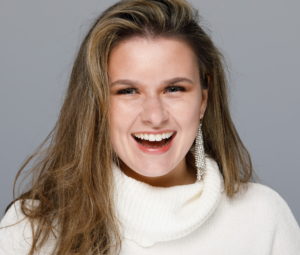3 min. read
Inspiring The Next Generation Of Female Engineers
Meet the 24-year old STEM Ambassador behind Movetru – a digital home physio software revolutionising rehabilitation
Can you tell me a little bit about Movetru and what motivated you to start this business?
So Movetru’s aim is to reduce rehabilitation time by 27%, or ultimately prevent injury in the first instance. This came from my own background which was in ballet. I started doing ballet when I was 4. I started teaching at 13, and at 14 I injured myself. It took three years and eight specialists to diagnose the issue, to which I was told that I would never be able to dance again. For quite a few years I had to figure out how I could continue to dance while being able to recover. That involved a lot of strength and conditioning training and a lot of testing.
Fast forward to my Master’s in Product Design Engineering, I put forward the idea of a device to reduce rehabilitation time. I had no idea how it would look. It was a viability and feasibility study to see if there was a potential device here to help people. I started that in September 2019. I was submitting it in March 2020. And by July 2020, I decided I have two months until my grad job starts to figure out a way to keep the business going. After realising that there was a product and a potential business there, I couldn’t walk away because I saw a massive social need.
Initially, our focus will be an elite, but I do want it to become something for everybody, and something to be able to help all ages and all different physical ailments. So there’s quite a wide range for Movetru.
Can you tell me about the team behind Movetru?
I initially started off as a female founder whenever I started back in July. At that time it was a lot of support from friends, family, and non-official mentors. They gave me either technical advice or emotional advice when starting a business. Now I have developed an amazing team. Right now we have two guys working full time on software development. We also have our summer placement student starting. He’s doing data analysis and machine learning.
Alongside that, I have an amazing board of advisors. My board of advisors consists of medical, legal, big data, machine learning, corporate business, and software development. They really are the backbone of everything. There are the people you go to with a big issue, and they can help you solve it.
Was it challenging to attract investors?
Everything we’ve done has been through grant and competition funding. Our plan is to raise equity investment at the end of the year. So what we’ve done today has all been through non-equity-related grant competitions. What we want to do is actually be able to raise the investment so that we can commit more people to be full-time and maintain the rate of development we’re going at.
We have received a lot of support on how to do pitch decks and finances. I think anybody that has a business wants to help. There’s also quite a lot of amazing networks of government companies and non-governmental companies who have helped and assisted.

Was it challenging to find other women to join your team?
I tried to find females for the team. There are lots of restrictions being a startup because we can’t provide a full time salary for an employee long term. So there’s a lot of risks associated as well. We haven’t been able to expand the tech team with females, which is what I really want to do. Especially with my passion to support women in tech.
“One thing I’m really proud of is that the team is really diverse in terms of skill set, ethnicity and neurodiversity. To me, that is also just as important to be considering. We are also highlighting areas that as a company culture, is there anything that would prevent a female coming into the team when that happens? I think that’s important to think of at the start, and what type of language is used within the company.”
That’s something that we’re trying to do from the outset. So that hopefully whenever we raise and expand the team, we will not hinder any women from joining.
What kind of judgement do women in STEM experience?
The experience of myself being a female engineer has had major negatives, but also more positives overall. In a way I’m glad to have had the negatives to be aware of, so now I can empathise, help and assist other women who have a similar experience. I have found that for women in STEM it depends on what area of STEM that you’re in.
“From my own personal experience in engineering, I’ve literally had someone walk up to me and tell me that females shouldn’t be engineers. So it can be tough.”
However, on the other side of it, since starting my business being a solo female founder in engineering, I have seen so many positive experiences. I really think again it comes back to company culture and how companies are supporting females as they come in.
I would say the stigma is changing which is amazing. Although even as a STEM Ambassador, I do some work with primary school levels. We still need to make changes at a very early age. Even at five and six years old. A six-year-old girl is heavily put off STEM because they think it’s a man’s job. So it’s not even in company culture. So I think there’s quite a lot of different areas that we need to work on.
From the TEDx talk that I did, I got a lot of girls from university messaging me. I was really targeting that for A level students that didn’t meet the gender stereotype and were unsure of what they wanted to do. I was really shocked that it was girls in first and second year of university that watched my TEDx talk. They reached out to me and said:
“I still don’t know if I should be an engineer. I don’t think my personality meets it.”
I was really taken back by the number of messages I received. But in a way I was so thankful that I had the opportunity to talk to them, and direct them to other areas and resources.
Overall, we need all types of skills in engineering. We need emotional skills, because how do people become emotionally attached to our product? We need caring skills because we’ll be going into biomedical engineering. There is such a diverse range of skill sets within engineering. I think we need to highlight that you can be emotional, or stubborn, or a tomboy or a really girly girl. We need all of these personalities in engineering.
What advice would you give to other women engineers who want to start their own business?
Ultimately, it’s taking the first step. But also really make sure that you know your customer. Because so many people have fantastic ideas. But we focus on other areas, and we lose sight of why we’re actually doing it, and who’s going to use it. The best thing we can do is actually speak to customers, see what annoys them, and find out if they would use your product.
Learn more about Movetru here.

